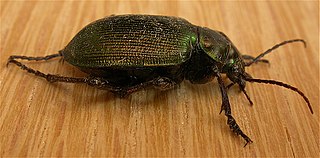
Calosoma sycophanta, the forest caterpillar hunter, is a species of ground beetle belonging to the family Carabidae.

Calosoma is a genus of large ground beetles that occur primarily throughout the Northern Hemisphere, and are referred to as caterpillar hunters or caterpillar searchers. Many of the 167 species are largely or entirely black, but some have bright metallic coloration. They produce a foul-smelling spray from glands near the tip of the abdomen. They are recognizable due to their large thorax, which is almost the size of their abdomen and much wider than their head.

Calosoma schayeri is a species of Carabidae that occurs in Australia. Like most Carabidae the larvae are predaceous. It is quite active at night when it is found hunting for slow-moving prey such as caterpillars. If handled it gives off an unpleasant scent.

Calosoma inquisitor is a species of ground beetle. The species is found in northern Africa, Europe and East to Asia Minor, Iran and the Caucasus, with isolated populations in eastern Siberia and Japan.

Calosoma investigator is a species of ground beetle belonging to the genus Calosoma and the subgenus Charmosta. The species is diffused in North-Eastern Europe and Siberia.

Calosoma scrutator, also known as the fiery searcher and caterpillar hunter, is a species of ground beetle belonging to the genus Calosoma, subgenus Acalosoma. This beetle can be as large as 35 millimetres (1.4 in) long. The distribution of this species is relatively widespread, and is common in North America. The adult beetle is known to excrete a foul-smelling oil when it is handled. The oil has been described as smelling similar to rotten milk or rancid olive oil.

Calosoma elegans is a species of ground beetle in the family Carabidae. It is found in Kazakhstan, Kyrgyzstan, and China.

Carabinae is a subfamily of ground beetles in the family Carabidae, containing ten genera and over fourteen hundred described species. It has two tribes, the Cychrini Laporte (1834) and Carabini Latreille (1802). The latter is divided into two subtribes, the Carabina Latreille (1802) and Ceroglossina Vacher de Lapouge (1927).

Platyninae is a subfamily of ground beetles.
Negreum is a genus of ground beetles in the family Carabidae. There are about 15 described species in Negreum, found in eastern Asia.
Calosoma catenatum is a species of ground beetle in the family Carabidae. It is found in Kenya.
Calosoma discors is a species of ground beetle in the subfamily Carabinae. It was described by John Lawrence LeConte in 1857.
Calosoma ewersmanni is a species of ground beetle in the family Carabidae. It is found in Turkey.
Calosoma glabratum is a species of ground beetle in the subfamily of Carabinae. It was described by Pierre François Marie Auguste Dejean in 1831.
Calosoma latipenne is a species in the beetle family Carabidae. It is found in the United States.

Calosoma maderae is a species of ground beetle in the subfamily Carabinae which is 25 to 35 millimetres long. It was described by Johan Christian Fabricius in 1775 and is found in Europe, North Africa and Asia.
Calosoma masaicum is a species in the beetle family Carabidae. It is found in Kenya.

Calosoma sayi, also known as "Say's caterpillar hunter or "Black Caterpillar Hunter", is a species of ground beetle of the subfamily Carabinae. It was described by Pierre François Marie Auguste Dejean in 1826. A large, lustrous black beetle found throughout the United States, its habitat is fields and disturbed areas. About 25mm to 28mm long, its grooved elytra have rows of metallic dots or pits. Said pits are smaller than many Calosoma, and are ruby red. Both larvae and adults prey upon other larvae and pupae, specifically those of grubs, flies, and lepidoptera.

Calosoma usgentense is a species in the beetle family Carabidae. It is found in Uzbekistan and Kyrgyzstan.











